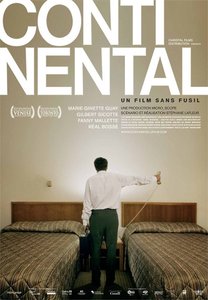The Genie Awards were given out annually by the Academy of Canadian Cinema and Television to recognize the best of Canadian cinema from 1980–2012. They succeeded the Canadian Film Awards (1949–1978), known as the "Etrog Awards" for sculptor Sorel Etrog, who designed its statuette.

Katherine Matilda Swinton is a British actress. She is known for playing eccentric and enigmatic characters, often working with auteur directors. She has received various accolades, including an Academy Award and a British Academy Film Award as well as nominations for three Golden Globe Awards. In 2020, The New York Times ranked her as one of the greatest actors of the 21st century.

Robert Lepage is a Canadian playwright, actor, film director, and stage director.
Possible Worlds is a play written in 1990 by John Mighton. The author, Mighton, is a mathematician and philosopher. His plays tend to meld science, drama and math into one cohesive piece. It is part murder mystery, part science-fiction, and part mathematical philosophy and follows the multiple parallel lives of the main character George Barber. Mighton, a mathematician from University of Toronto's Fields Institute, brought his considerable professional experience to bear on the writing of the play.
The Academy of Canadian Cinema & Television is a Canadian non-profit organization created in 1979 to recognize the achievements of the over 4,000 Canadian film industry and television industry professionals, most notably through the Canadian Screen Awards The mandate of the Academy is to honour outstanding achievements; to heighten public awareness of and increase audience attendance of and appreciationпа of Canadian film and television productions; and to provide critically needed, high-quality professional development programs, conferences and publications.
The 15th Genie Awards were held on December 7, 1994 to honour Canadian films released in 1993. Actor Graham Greene hosted the ceremony.
Patrice Vermette is a Canadian production designer/art director. He is most noted for his work on the films C.R.A.Z.Y., for which he won both the Genie Award for Best Art Direction/Production Design at the 26th Genie Awards and the Jutra Award for Best Art Direction at the 8th Jutra Awards, and Dune, for which he won the Academy Award for Best Production Design at the 94th Academy Awards.

Continental, a Film Without Guns is a 2007 Canadian comedy-drama film directed and written by Stéphane Lafleur.
François Séguin is a Canadian production designer, art director and set decorator.

Victor Sarin is an Indian-born Canadian/American film director, producer and screenwriter. His work as a cinematographer includes Partition, Margaret's Museum, Whale Music, Nowhere to Hide, Norman's Awesome Experience, and Riel. He also directed such projects as Partition, Left Behind, and Wind at My Back.

Francis Leclerc is a Canadian film and television director, screenwriter and film editor. He is the son of Félix Leclerc. Since 1995 he has worked in the Quebec film industry, directing music videos for many well-known Quebec artists. He has directed more than 20 short and medium-length films, including a television adaptation of Robert Lepage’s Les Sept branches de la rivière Ota. He directed and co-wrote his critically acclaimed debut feature, A Girl at the Window , in 2001. His second feature, Looking for Alexander , a nuanced and mature work about lost memory and childhood tragedy, secured him Genie Awards for best director and screenplay as well as the Prix Jutra for direction.
Guy Dufaux is a French-born Canadian cinematographer. The majority of his works have been in Canadian cinema; he immigrated to Canada in 1965 and became a Canadian citizen in 1971. He is also the father of Montréal-based sculptor Pascal Dufaux and the brother of the late Canadian documentary filmmaker, Georges Dufaux.
The Alley Cat is a 1985 Canadian/French French-language drama film based on the novel of the same name by Yves Beauchemin.
Benoît Pilon is a francophone Canadian director and screenwriter particularly noted for his innovative films and documentaries on the human condition. He is also the co-founder of "Les Films de l'autre" productions, which produces, promotes and helps the development of independent films throughout North America.
North Station is a Canadian children's comedy film, directed by Jean-Claude Lord and released in 2002.

Anne Émond is a Canadian film director and screenwriter, currently based in Montreal, Quebec.
Triptych is a 2013 Canadian drama film directed by Robert Lepage and Pedro Pires. Adapted from Lepage's theatrical play Lipsynch, the film centres on Michelle, a woman who has just been released from the hospital following a diagnosis with schizophrenia, and her sister Marie, a singer and actress who is herself recovering from brain surgery that has left her temporarily unable to speak.
Pedro Pires is a Canadian film director. His short film Danse Macabre won the award for Best Canadian Short Film at the 2009 Toronto International Film Festival and the Genie Award for Best Live Action Short Drama at the 30th Genie Awards, his short film Hope was a Genie Award nominee for Best Live Action Short Drama at the 32nd Genie Awards in 2012, and he was a Canadian Screen Award nominee for Best Director at the 2nd Canadian Screen Awards in 2014 for Triptych, which he co-directed with Robert Lepage.
The Novena is a 2005 Canadian drama film, directed by Bernard Émond.
Happy Camper is a Canadian crime comedy film, directed by Sylvain Roy and Guy A. Lepage and released in 2004. The film stars Lepage as Pierre-Louis, an investment banker who is forced into witness protection after witnessing a crime committed by Jackhammer, the leader of a local biker gang. Assigned to a rural trailer park with the new name Marcel Paquette, he has to fight to stay alive after the gang organizes a plan to find him and retaliate.





